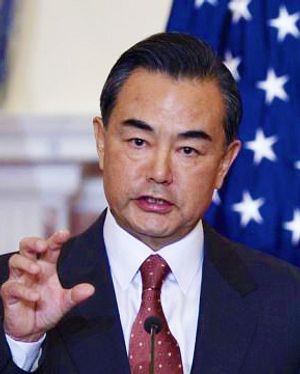On December 16, Beijing hosted the first China-Afghanistan-Pakistan Foreign Ministers’ Dialogue. The three countries’ foreign ministers — China’s Wang Yi, Afghanistan’s Salahuddin Rabbani and Pakistan’s Khawaja Muhammad Asif — attended the meeting.
The countries agreed to establish a trilateral dialogue mechanism in June aimed at reinforcing trilateral cooperation in politics, economics and security. Afghanistan will host the second dialogue in Kabul in 2018.
During the press conference after the meeting, Wang announced that “Afghanistan and Pakistan agreed to improve bilateral relations as soon as possible and to realize harmonious co-existence, promising to resolve their concerns through comprehensive dialogue and consultation.”
“This is important progress achieved in the meeting,” Wang said.
The agreement on economic cooperation regarding the China-Pakistan Economic Corridor (CPEC) — a flagship project under China’s Belt and Road Initiative (BRI) — is another important achievement stemming from the meeting, at least from Beijing’s perspective.
Wang announced that China and Pakistan are planning to extend the CPEC to Afghanistan. “In the long run, through Afghanistan, we will gradually connect the CPEC with the China-Central and Western Asia Economic Corridor,” Wang said.
Beijing has repeatedly claimed that the 3,000 km CPEC — which starts in Kashgar and ends at Pakistan’s Gwadar port — will connect “the Silk Road Economic Belt in the north and the 21st Century Maritime Silk Road in the south.” Under the framework of the BRI, China will invest billions into building a “network of highways, railways, pipelines and optical cables” along the corridor.
India, supported by the United States, has opposed the CPEC on the grounds it passes through territory disputed between India and Pakistan.
In mid-December, Pakistani National Security Adviser Nasser Khan Janjua harshly criticized the United States and India for “conspiring against” the CPEC during a seminar in Islamabad.
In the press conference after the trilateral dialogue Wang once again emphasized that “the CPEC has not targeted at any third party, but hopes to bring benefits to the entire region and become an important driving force for regional integration.”
“The CPEC is an economic cooperation project and should not be politicized,” he added.
That said, China’s ambition to further incorporate both Pakistan — which has long been dubbed China’s “good friend” — and Afghanistan into its sphere of influence through this dialogue is obvious. Pakistan and Afghanistan seem ready to play along.
According to Pakistan’s foreign ministry, Afghanistan and Pakistan “congratulated China on the successful conclusion of the 19th National Congress of the Communist Party of China, and fully supported the initiative proposed by Chinese President Xi Jinping to build community with a shared future for mankind. ”
“Our dialogue is not targeted at any other party nor will it be subject to influence from other countries or forces,” Wang said during the press conference.
Yet as The Diplomat noted in August, when U.S. President Donald J. Trump issued his grand strategy for Afghanistan and South Asia, he singled out Pakistan for being a terrorist safe haven. In the recently released National Security Strategy, the United States once again harshly targeted Pakistan (together with Russia and China) for various issues.
Last week, U.S. Vice-President Mike Pence said during a visit to Afghanistan that Pakistan has for too long provided safe haven to the Taliban and other terrorist organizations and “President Trump has put Pakistan on notice.”
Against the backdrop, China’s active support for Pakistan and Afghanistan in multiple fields will undoubtedly challenge the U.S. role in the region.
In addition, China and Pakistan announced during the dialogue that they will support the Afghan government to push forward peace talks with the Taliban.

































